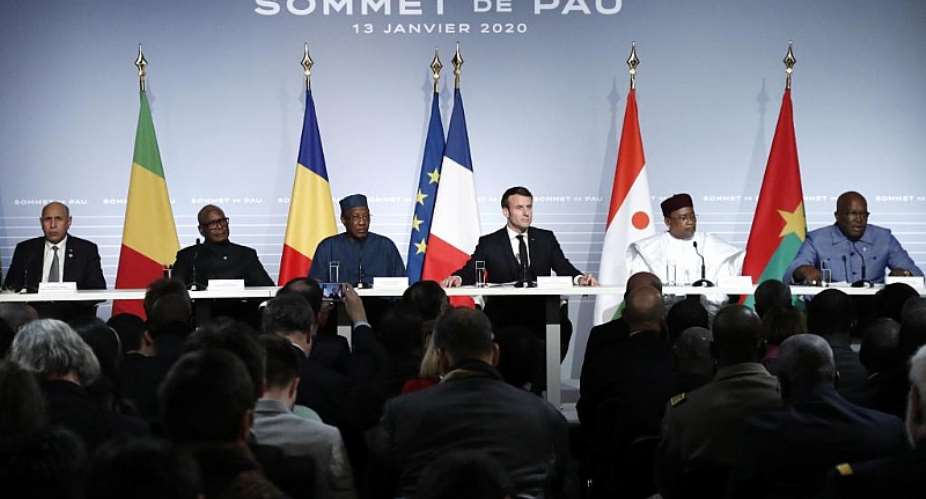France is to deploy an additional 220 troops to the Sahel to try to quell a spike in terrorist violence that has dented the credibility of its 4,500-strong Barkhane force and fuelled anti-French sentiment. The leaders of the G5 Sahel countries at the summit in Pau said they welcomed the support.
President Emmanuel Macron and the leaders of Mali, Niger, Chad, Burkina Faso and Mauritania put on a display of unity at the summit in the southern French city on Monday, as they moved to find common ground in the battle against insurgents in the Sahel and debunk myths about France's presence in the region.
The summit was called in response to growing hostility in West Africa towards the former colonial power, for failing to restore stability in the restive Sahel.
Macron said he wanted "clarity" from his West African partners about whether they wanted France's presence or not, and had warned he could withdraw French troops without a clear political commitment from them.
After a two-hour meeting behind closed doors, the situation had been clarified, he said.
"The Pau summit is a turning point in our military strategy," declared the French leader during a press conference at Pau castle, hours after presiding over a wreath-laying ceremony at a memorial for several French soldiers who died in Mali last November.
The increasing number of casualties on both sides has spurred French and African forces to unite under a new command structure, known as the Coalition for the Sahel, which will include France's 4,500-man operation Barkhane and the 5,000 strong G5 force of West African nations.
Another 220 French troops will be sent to give fresh momentum to the push against fighters linked to the al-Qaeda and Islamic State terror groups, with more European special forces expected to join in the coming months, Macron added.
African sovereignty
"French troops are in the Sahel to enable West African leaders to fully assume their sovereignty," insisted the 42-year-old leader, in response to allegations that France was pursuing a neo-colonial approach.
Counterterrorist activities are spread across the five Sahel countries, but the future focus will be on three of the most dangerous zones bordering Mali, Niger and Burkina Faso.
"The priority is Islamic State in the Grand Sahara," Macron continued. He also called on Barkhane and G5 forces to strengthen the development side of their operation to regain the trust of civilians.
The Sahel, a semi-arid region just below the Sahara desert has been gripped by insecurity since 2012, when Tuareg rebels tried to seize control of northern Mali, prompting Paris to intervene through its operation Serval.
French troops were hailed as heroes in 2013 for helping to prevent the insurgency from reaching the capital Bamako.
Seven years on, the security situation has deteriorated. A suspected jihadist attack on a Nigerian army base on Thursday that killed 89 soldiers was just the latest reminder of the persistent terror threat. And many wonder if the presence of outside forces has not made it worse.
Anti-French protests
Earlier on Monday, several members of the African diaspora demonstrated outside Pau police station, echoing similar anti-French protests in the Sahel, to urge French authorities to end "their occupation."
"There is no ambiguity on the part of G5 countries about whether international forces should remain in the Sahel," Mali's Foreign Affairs minister Tiébilé Dramé told RFI. "They are here because we asked them to come."
Publicly, G5 leaders were more cautious in their statements. Burkina Faso, which holds the regional group's rotating presidency, called for better military results to reassure local populations.
The other four G5 leaders declined from taking questions at Monday's press conference, careful not to upset voters unhappy with the presence of the former colonial power.
The Pau summit was intended to identify a common enemy and map out new milestones to measure quantifiable military results. The new Coalition for the Sahel will put an emphasis on greater intelligence-sharing, which according to Burkina Faso leader Roch Marc Christian Kaboré is the "key" to achieving military success.
A question mark hangs over the engagement of the United States, which has threatened to wind down its military operations in West Africa, potentially depriving Barkhane forces of vital intelligence, logistical and drone support.
The first measure of the summit's success will be in June at the next G5 meeting in Mauritania, where Macron has promised to present "tangible results".





 Akufo-Addo commissions Phase II of Kaleo solar power plant
Akufo-Addo commissions Phase II of Kaleo solar power plant
 NDC panics over Bawumia’s visit to Pope Francis
NDC panics over Bawumia’s visit to Pope Francis
 EC blasts Mahama over “false” claims on recruitment of Returning Officers
EC blasts Mahama over “false” claims on recruitment of Returning Officers
 Lands Minister gives ultimatum to Future Global Resources to revamp Prestea/Bogo...
Lands Minister gives ultimatum to Future Global Resources to revamp Prestea/Bogo...
 Wa Naa appeals to Akufo-Addo to audit state lands in Wa
Wa Naa appeals to Akufo-Addo to audit state lands in Wa
 Prof Opoku-Agyemang misunderstood Bawumia’s ‘driver mate’ analogy – Miracles Abo...
Prof Opoku-Agyemang misunderstood Bawumia’s ‘driver mate’ analogy – Miracles Abo...
 EU confident Ghana will not sign Anti-LGBTQI Bill
EU confident Ghana will not sign Anti-LGBTQI Bill
 Suspend implementation of Planting for Food and Jobs for 2024 - Stakeholders
Suspend implementation of Planting for Food and Jobs for 2024 - Stakeholders
 Tema West Municipal Assembly gets Ghana's First Female Aircraft Marshaller as ne...
Tema West Municipal Assembly gets Ghana's First Female Aircraft Marshaller as ne...
 Dumsor is affecting us double, release timetable – Disability Federation to ECG
Dumsor is affecting us double, release timetable – Disability Federation to ECG
